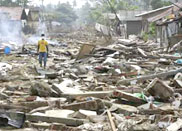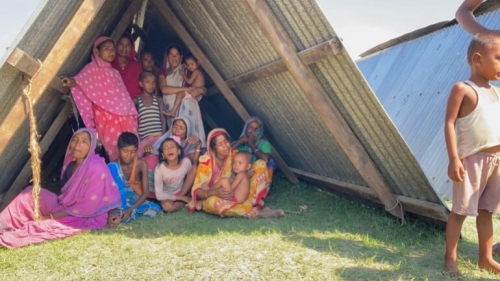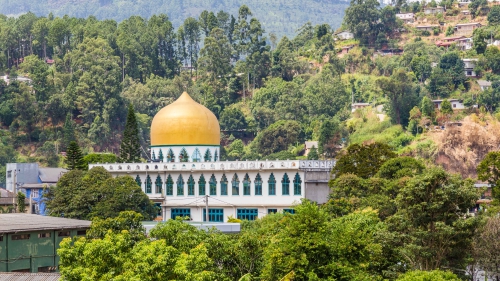Attorney to Relief Worker
Ahilan Arulanantham is an attorney with ACLU-Southern California. He was in route to his home country Sri Lanka when the Tsunami hit. Following is a first hand account of the devastation immediately after the demolition waves hit the region.
 |
|
Tsunami devastation |
I had planned a trip to Colombo and Jaffna with my dad some time ago. We learned about the Tsunami while on the way from Taipei to Singapore. Once I got here (Colombo, Sri Lanka), I went with my uncle and cousin as part of a medical team to provide assistance in Batticaloa, which is one of the worst affected areas of the country, in the Eastern Province. I am now back in Colombo after three days there. I am here for about twenty-four hours and then plan to head back to some other affected areas, this time with my father.
The devastation I saw is worse than any I have ever seen before. I say this as someone with experience working with refugees in India, Sri Lanka, and the United States. For example, on the first day in Batticaloa we saw roughly 200 people who came to a church to receive medical assistance from us. Every single person we saw had seen members of their family swept away in the ocean within the previous 48 hours. We met parents who had seen all their children carried off, little girls and boys who had seen their parents drown before their eyes, people who had watched all of their material possessions disappear in an instant. Some people climbed onto their rooftops to try to save themselves, only to have their houses demolished by the waves. A number of the people working with us had spent the previous thirty-six hours disposing of bodies. I could go on.
Here in Colombo people are talking a lot about the death toll in numbers, but my cousin noted that in the area we came from people were not really thinking about things in such abstract terms. They were thinking about people who had died, whole villages with hundreds of years of history just wiped away.
Work on the medical team was both rewarding and frustrating. My informal job on the team, as someone with zero medical knowledge, was to organize the physical layout of how we were going to see people, dress their wounds, and dispense their medication, and then to actually do the dispensing by filling little paper envelopes with the right dosages of the medications our doctors had prescribed, and then explaining the dosage to the people in question (e.g., take half a tablet of this three times a day for three days, take this before sleeping, etc.). I have learned the names and uses of a number of medications that we are dispensing and also learned to accurately could pour out pills - for example, I can now almost always pour 16 to 20 amoxycillin or paracetamol tablets out in a single motion (we are usually prescribing 18 - three days worth). I found myself somewhat reveling in the mind-numbing quality of this. I know that sounds horrifically banal, but it's incredibly hard to see that many extremely traumatized and sick people and listen to that many completely horrible stories without trying to numb the experience of suffering and destruction. I am used to dealing with a certain amount of suffering - I see it every day in my work and have for much of the last several years. But this is really on a totally different level.
I have spent much of today, while back in Colombo, trying to help organize and coordinate relief efforts. I know logistics on this scale are always incredibly complicated, but it is nonetheless frustrating to see how hard it is to get help to those who need it. The government, sadly, appears to have sent a disproportionate share of the relief to southern Sri Lanka, which is the predominantly Sinhala area, rather than to the eastern and northeastern parts of the country, which are predominantly Tamil. And, although I hate to sound like I'm trying to be "balanced," it is a fact that the LTTE has also let its political calculations play a role in determining how it organizes relief efforts in the areas it controls. I have heard from some people that news coverage in the western media has focused more on southern Sri Lanka rather than the northeast, despite the fact that both have been terribly affected.
That being said, I also saw tremendous signs of people coming together across the racial divide during this crisis - something which is almost unheard of in the conflict areas of Sri Lanka. I personally witnessed a Sinhala army soldier make a plea for us to send our medical team to a camp of Tamil refugees in his area, and we heard stories of the LTTE saving whole Sinhala villages in the east. These are astounding events when viewed in the context of Sri Lanka's recent history.
It is also wonderful to see such a huge outpouring of sympathy, including from Tamils from all over the world who have come to provide medical support. I am lucky to have several friends and relatives who were already doing great humanitarian work here in response to the problems created by the civil war (for those who know him, the best person has been Chandran Mama), and they have helped me and my father organize the efforts of people from abroad whom we know.
To that end, let me give a bit of information for those who want to contribute to relief efforts. I have seen first-hand a few organizations that are doing good work here and have the capacity to handle more resources. One is TRRO (Tamil Refugee Relief Organization), which is based in California and has been doing good work sending tents, doctors, and other resources to several parts of the country. My mother has their contact information, including information for giving donations. You can call or email her (she knows people might be contacting her) at 661.942.0120 or [email protected]. Another is Terre des Hommes, a Swiss organization that I saw coordinating a lot of medical relief on the ground in Batticaloa.
Another excellent group is YGRO, a local group with an excellent track record in Sri Lanka that will focus on the slightly longer-term task of rehabilitating certain parts of the affected areas in both the south and the east. I have gotten their account information, so I will go ahead and put it here for people interested in wiring money.
YGRO Limited
H.S.B.C. (Hong Kong Shanghai Banking Corporation)
Routing Reference #: HSBCLKLX
Checking Account #: 005-026141-001.
In addition, I know that both Oxfam and a German organization called GTZ (I've only seen the acronym) have been doing good work here providing fresh water supplies. Apparently they are the water experts around here.
Some people asked about the kinds of medical problems we are seeing. We saw a lot of people with wounds that needed dressing and antibiotics to stop them from becoming infected, because people had gotten hurt climbing onto and off of their roofs, and also hanging onto trees to prevent themselves from being washed away. We also saw some early stage dehydration, which is treatable with oral rehydration powders. There were also people suffering from acute anxiety and shock (for which we gave anti-anxiety drugs - valium and similar medications), and people with various kinds of respiratory problems (treated with ventolin and cough medications).
We are also seeing problems which aren't medical as such, but which have serious health effects. A huge number of the people we saw had lost their homes, so there will be a longer-term need for shelter. Although there were exceptions in some areas, pretty much everything within about 3 kilometers of the beach in Batticaloa washed away, so tons of people have been displaced for the longer-term by this. I also imagine there will eventually be a need for more drinking water. To give you a sense of the latter, we went to a tiny thosai (a.k.a. "dosa") diner to have a meal after the second day - it was pouring rain and that was one of the few places that was open. We had a nice, although simple, meal of thosai and sambar, but they couldn't give us tea because the restaurant's water supply had actually become salinated because of the saltwater from the tidal wave. I have no idea as to how you get excess salt out of the freshwater table, but I hope someone else does.
Finally, I should say that none of my immediate or extended family has been harmed, because none of them live on either the eastern or southern coasts. This is just random luck really. Practically everyone living here has lost someone to this disaster, but every reasonably close relative of mine happens to live in either the north, central, or southwestern part of the country, none of which were seriously affected.
I myself am totally fine, although somewhat sleep-deprived. Going around with a team of doctors, nurses, and other volunteers doing relief work means I have never felt lacking for anything essential.
I was somewhat scared a couple of times. One day, while we were dispensing medication at a makeshift camp for internally displaced people, we heard a government announcement that there had been an aftershock earthquake, as a result of which they recommended evacuation of low-lying areas near the beach. The terror unleashed by the announcement was horrible to behold. People standing in front of me holding prescriptions which I was in the process of filling just screamed and ran away, trying to get to their houses so they could climb the roof. It was unbelievably sad -- the trauma caused by this incident will probably never go away for these people. I also felt scared, having seen the destruction wrought by the wave, and we were in a low-lying area near the coast when we heard about the announcement. But people told us that the water had not come that far the first time, and we really had no way of getting out efficiently, so we stayed. In the end nothing happened, although we heard a rumor that there had been a swell in the tide later that day.
The other time I got a little frightened was when the bus I was taking out of Batticaloa started to flood with water around it, which actually came from extremely heavy rains that started the night before we left. At one point, as we crossed a field area, water actually started coming through the floorboards at the rear of the bus. The bus conductor told people to move to the front of the bus and that seemed to take care of the problem, but it was definitely kind of scary. That same flooding made the road to Batticaloa completely impassable for parts of today. Hopefully it will be better soon.
I should add before I go that, although the tragedy has been horrible to behold, I am happy to have ended up here at this time. If someone had told me that I would end up returning to the Tamil parts of Sri Lanka after twenty-four years by being part of a medical relief team going to Batticaloa, I would never have believed it.
Ahilan
Related Suggestions











